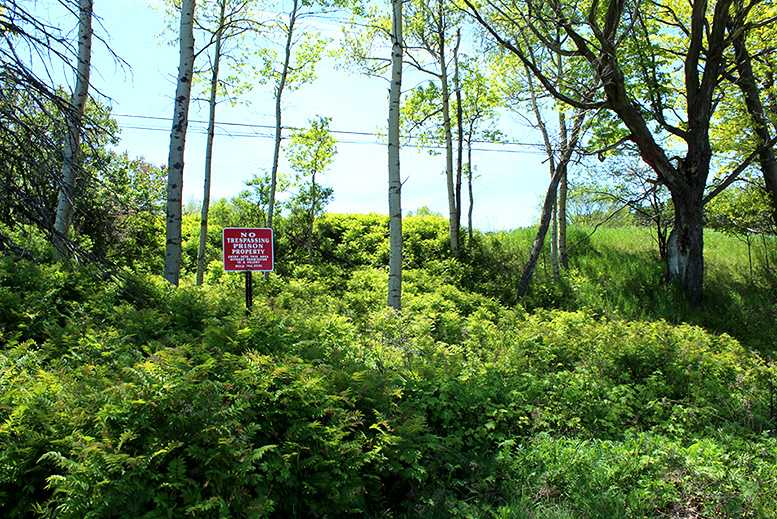Along with a new major where students will be able to observe dead bodies for research, NMU is developing a forensic anthropology center that will also be a training ground for crime scene investigators.
Construction of the fencing for the Forensic Research Outdoor Station (FROST) is expected to begin mid-June according to NMU officials.
“What we hope to do is have a range of courses in forensic anthropology as a concentration within the anthropology major,” said Alan McEvoy, head and professor of the sociology/anthropology department at NMU. “Many of these courses we hope to have cross listed with studies like criminal justice, biology and even biochemistry. There’s a range of courses and disciplines that are affected by this so what we’re hoping to do is be as cross disciplinary as possible in our offerings as we develop this further.”
The 2.5 acres of land recently signed over to NMU by Gov. Rick Snyder will be used for studying human decomposition in a cold weather climate as well as crime scene investigation forensics training for criminal justice majors. A forensics concentration is but one part of the anthropology major that students can choose in the
program.
In conjunction with the university’s anthropology program, the FROST facilities will be funded and operated by NMU. Once it is structured and secured, the forensic outdoor site will be the seventh forensic research facility in the United States and the eighth in the world—but it will be the only cold weather research facility of its kind anywhere on the globe.
The site will be located on U.S. 41 between the Marquette Branch Prison and the Michigan Department of Natural Resources office, in the vicinity of the Marquette Area Wastewater Treatment Facility.
McEvoy said the facility will have a major focus on two fundamental things: basic research on aspects of human decomposition in cold weather, which will be the “body farm,” and police training, which will include crime scene investigation, potential cadaver dog training and a range of other police force training programs.
“In both instances, students will get hands-on experience that they couldn’t get anywhere else,” McEvoy said.
Even the Federal Bureau of Investigation is interested in this new facility, McEvoy said, adding that the research that can be done in this climate is conducive for solving investigations into missing people and finding a positive match when unidentified remains are found.
“No one really understands the effects of freezing and thawing—the long term effects and how that compares to other decomposition processes, especially in this biome,” McEvoy said. ”The biome is different here. The impact of freezing and thawing is different. The insect population is different. The soil conditions are different. There is a range of variables we’ll be looking at in studying human decomposition.”
Such research could not only help missing persons units to possibly trace unidentified remains back to a missing person but it could also help local and state police forensics determine what a missing person’s cause of death was.
One of the three candidates currently vying for a senior administrative FROST director position gave a presentation on forensic anthropology to about 50 members of the law enforcement and academic communities at NMU in early July. As of now there are still two candidates who have yet to give presentations. McEvoy said the choice of director will be finalized by the fall and that person will eventually become integrated into the NMU faculty and go on to teach their own courses in the sociology/anthropology department after the site is fully operational. The director of the facility will also be solely responsible for setting up a body donor program for the FROST once the lab facility for intake and preparation of donations is constructed. Donors will most likely come from the Michigan area once the program is established.
In addition to the body farm, the FROST will include an on-campus laboratory that any student can use to do scientific research so long as they have access. It will be a crossdisciplinary lab facility that will serve as the access point for NMU students, McEvoy said.
After the bodies have decomposed and undergone masseration, removal of any remaining tissue, McEvoy said there will be an osteological collection of the bones followed by a curated display of the bones that may go in the NMU Research Institute located in the former Lee Hall. The bone collection process will allow researchers to observe bone-related issues like skeletal trauma that can come from burning or blunt force trauma, or even the bone trauma from a gunshot.
“We will also be able to understand things like dietary practices and so forth,” McEvoy said.
One of the potential funding sources for FROST is the National Institute of Justice. Another source could potentially come from state or local law enforcement using the facility as direct training site. McEvoy said so far a single private donor has contributed monetary resources so the lab can obtain a fumehood. He said there are three major outcomes of what he would like to see the forensic research site evolve into.
“In the grand scheme of things I see three things: Improvement of crime scene investigation to help police solve crimes and identify missing persons, a basic scientific understanding of human decomposition in cold weather and giving students marketable skills that are unique to NMU.”
























